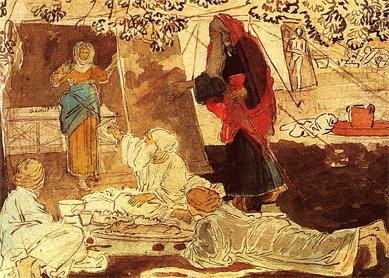Leah is a central yet often forgotten matriarch in the Genesis story. She is the older sister of Rachel (Gen 29:16) and the first wife of Jacob (Gen 29:25-26). Her character is intentionally juxtaposed to her sister Rachel, from comparison of their physical descriptions (e.g., Leah’s soft or weak eyes) to discussions of their fertility. Yet the sisters are remembered in unison as mothers who “together built up the house of Israel” (Ruth 4:11). Leah is often described as the less favored and unloved wife, but her status as the primary wife is quite significant. From her sons, Judah and Levi, will come influential tribes on the pages of Israel’s story and Israel’s greatest king, David.
What kind of treatment did Leah receive from her father, Laban?
Leah’s story is shaped by her troubled relationship with her father, Laban. This can be seen in two distinct episodes: (1) Laban’s actions on Jacob’s wedding night and (2) Leah’s description, along with Rachel’s, that they have been “sold” by Laban and treated as “foreigners” (Gen 31:14-15). These moments demonstrate that Leah is viewed in the family system as an object, a foreigner, and property.
In Gen 29, Laban uses Leah to trick Jacob. The trickster, Jacob, is tricked by his uncle! On Jacob’s wedding night to Rachel, Laban “takes” his firstborn daughter Leah and gives her to Jacob as a surprise bride swap (Gen 29:23). Leah is silent through this episode, and Jacob is unaware of this plot until the next morning. In the morning, Laban explains that marrying the oldest daughter first was customary. He cunningly withheld this piece of information until after the wedding night (Gen 29:26). Jacob is instructed to finish the bridal week with Leah, and then Laban will offer his younger daughter Rachel, the one Jacob loves, in exchange for another seven years of work (Gen 29:27). Leah is therefore but a means to an end for her father. Though silent in this exchange, Leah will later voice in Gen 31:14-16 that she is treated like “property.” Laban’s actions have unforeseen consequences, and what he imagines he is gaining is short-sighted.
Laban gives Zilpah as a servant to Leah and Bilhah as a servant to Rachel, which suggests that Laban recognizes some paternal obligation to his daughters. In an ironic twist, Rachel and Leah treat their servants in a similar manner as they have been treated, giving the two women to Jacob as “wives” so that they may bear his children on their behalf (Gen 37:2). Thus, these two women, Bilhah and Zilpah, will also be mothers of Jacob’s children. The use of women as servants and surrogates without consent is frustrating and appalls readers in our modern context. But it reveals the importance of childbearing for a family’s continued lineage (e.g., Sarah [Gen 16]; Tamar [Gen 38]; Ruth).
In Gen 33, Leah and her sister, Rachel, express frustration with their father’s treatment of them. The Lord had instructed Jacob in a dream to return home to the land of Canaan (Gen 31:3). Upon hearing about the situation, Leah and Rachel both say that their father treats them as “foreigners” and as property (Gen 31:14-16). All that Laban hoped to gain through the trickster marriage will come to an abrupt end. In this scene, Leah voices with her sister that they are mistreated. They therefore agree with Jacob that it is time to leave their father and travel to the land of Canaan, Jacob’s homeland. Even though this “return home” is not home for Leah and Rachel, they side with Jacob’s innocence at Laban’s accusations (Gen 31:1-13). Perhaps the idea of homeland and belonging is not only connected to geographic space but to Jacob, their children, and each other.
How did the Lord provide for Leah in this difficult marriage situation?
Leah’s difficult situation provides an opportunity to engage God (Gen 29:33, Gen 35; Gen 30). Leah is distressed in her marriage to Jacob and by her rivalry with Rachel for his affection. The Lord “sees” Leah’s distress, that she is “unloved.” The Lord enables Leah to conceive, and she names the first three sons after her misery (Gen 29:31). Leah’s first son is named Reuben “Because the Lord has looked on my affliction; surely now my husband will love me” (Gen 29:32). Next is born Simeon, “Because the Lord has heard that I am hated, he has given me this son also” (Gen 29:33). The third son of Leah and Jacob is Levi. With this birth Leah proclaims, “Now this time my husband will be joined to me, because I have borne him three sons” (Gen 29:34).
It becomes clear through these three names that Leah feels unloved and alone in her marriage. Nevertheless, it is also apparent through these names, that she understands that the Lord sees her and hears her. Her fourth son will be named without reference to Jacob. Leah names him Judah and says, “This time I will praise the Lord” (Gen 29:35). God sees Leah’s struggle for favor with Jacob and answers Leah’s prayers with three additional children: Issachar (Gen 30:18), Zebulun (Gen 30:20), and Dinah (Gen 34:1).
Although she experienced feeling unloved in life, Leah is honored in death. Though the text is silent concerning the timing of her death, her burial is in the cave in the field of Machpelah, previously purchased by Abraham. This is the resting place for Jacob’s family in the promised land. Leah is thus honored by being buried alongside Abraham, Sarah, Isaac, Rebekah, and Jacob (Gen 49:31). Moreover, she is remembered by future generations as one of the mothers of Israel.




